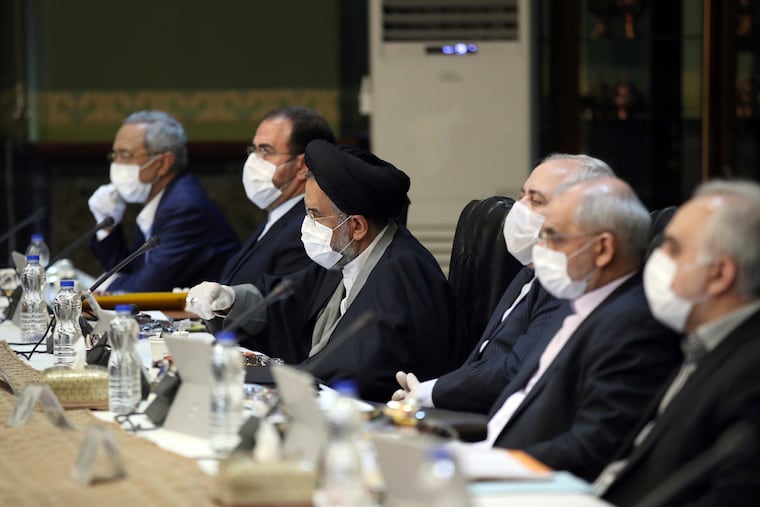A deal with Iran? Coronavirus aid in return for U.S. prisoners? | Trudy Rubin
Pandemic is exploding in Iran, which is holding four U.S. political prisoners, but can't get medical supplies due to U.S. sanctions. Let's make a humanitarian deal.

News about the coronavirus is changing quickly. Go to inquirer.com/coronavirus for the latest information.
While Americans are wrestling with how to get tests and equipment to curb the coronavirus, it’s easy to forget this is a global crisis.
Unless the virus is quashed everywhere, it can resurge anywhere. That means the U.S. government has to be concerned about the skyrocketing epidemic in Iran, where a venal theocracy and crippling sanctions have left the population exposed.
We should also be concerned about (at least) four U.S. citizens (and half a dozen other Westerners) who are being held as political prisoners in Iran, where the crowded prisons are petri dishes of contagion, without medicine or disinfectants or gloves or temperature checks.
So here’s a spot of good news: the pressure of the epidemic may force a humanitarian deal between Washington and Tehran. At the start of the Persian New Year, there are signs that Iran may free some U.S. citizens while Washington may finally facilitate desperately needed humanitarian aid to Tehran. Neither could happen too soon.
On Thursday, Iran released U.S. Navy vet Michael White on medical furlough to the Swiss Embassy in Tehran, which represents American interests.
White apparently had the misfortune to visit an Iranian girlfriend in 2018 in the northeastern city of Mashhad, at a time when Iran’s Revolutionary Guards were seeking payback for U.S. sanctions, in the wake of the Trump administration’s withdrawal from the Iran nuclear deal. Since then, Iran has been arresting Western academics and dual citizens visiting Iranian family members, and holding them as hostages for future political bargaining.
White was sentenced to 13 years for “espionage” and is now suffering from cancer, besides being exposed to the virus. It’s unclear yet when or whether he will be allowed to return home.
Equally painful is the case of dual Iranian-American citizen and U.S. businessman Siamak Namazi, who was jailed in 2015 while visiting family in Tehran. His 84-year old father, Baquer, who was arrested in 2016 when he came to try to help his son, has been paroled but can’t leave Tehran.
And, although the regime has furloughed tens of thousands of Iranian prisoners over the Nowruz holiday, Siamak remains in a crowded cell. “The only way to describe it is beyond horrific,” his brother told NPR on Wednesday. "Imagine a room which is very, very small with 15, 20, 25 people crowded in there, not having access to basic products for disinfectants, not having medicine, not being tested. The prison is not containing the virus.”
Held nearby Namazi is dual U.K.-U.S. citizen Morad Tahbaz, whom I’ve written about, imprisoned since 2018. His crime was working with the Persian Heritage Wildlife Foundation (PHWF) to save endangered cheetahs (all nine of the PHWF staff were also imprisoned, and one, a Canadian-Iranian died during interrogation). Tahbaz also has cancer and hasn’t been furloughed.
“The prisons by definition are the complete opposite of social distancing, and the prisoners (including Iranian human rights activists) are like sitting ducks being sacrificed,” I was told by Hadi Ghaemi, executive director of the U.S.-based Center for Human Rights in Iran. “This is a way to get rid of a lot of political prisoners.”
So hats off to Secretary of State Mike Pompeo for calling on Iran to release “all wrongfully detained Americans as COVID-19 spreads to Iranian prisons.” He’s also insisted that “any nation considering humanitarian assistance to Iran should seek the release of all dual and foreign nationals,” i.e., hostages who come from Britain, France, Austria, and elsewhere.
But, of course, the question is what kind of aid the Iranian government would seek in return.
Only this week, the Trump administration piled more sanctions on Tehran, designed to further squeeze any efforts to evade past sanctions on Iranian oil sales. Oil sanctions have cratered the Iranian economy (with no clear U.S. definition of what it would take to get them lifted).
And there’s no question that the sanctions have blocked Iranian access to desperately needed medical supplies and equipment to fight the coronavirus, even though humanitarian goods are supposed to be exempted.
Washington has just established a “Swiss humanitarian channel” through which food and medicine can be sent to Iran, but it is just starting trial operations. Any organization seeking to use it must receive written guarantees from the United States that it will not be sanctioned.
Such a limited channel at a time of coronavirus is a sham.
True, the Iranian regime has been shockingly lax in confronting the pandemic, with many of its own political elite infected, and bears heavy responsibility for its spread. But Iran’s death toll is soaring. And although it has a decent health system, the caseload could soon spiral out of control without adequate medical supplies.
So Pompeo (together with European counterparts) should go big on a humanitarian aid deal in exchange for the release of Western hostages. This is not about Tehran regime change or shaming the ayatollahs. It’s not about punishing Iran for its malfeasance in the Middle East.
“An urgent bypass to sanctions is needed to focus on the epidemic, “ says Ghaemi. “This is in everyone’s interest. This is above geopolitics. It is about bringing a pandemic under control, about addressing a collective danger.”
A pandemic explosion in Iran threatens us all.